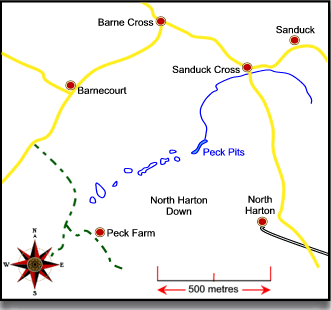
“Keep the Sabbath Holy”, was always the watchword on the farms of Dartmoor, which meant no work whatsoever and to ignore this warning was to invite the wrath of the Lord. Even more strictly observed was the tradition that no earth should be so much as scratched on Good Friday for to do so would assuredly mean the failure of any crop which was planted in such ground. Throughout the Westcountry many farmers observed this tradition and Dartmoor was no exception to the rule, well almost …
Just to the west of Lustleigh Cleave is the small Peck Farm, and belonging to this is Peck Pits and for centuries it was believed that the flooded and larger pit was bottomless. Indeed it was said that the waters were so deep they lapped the shores of Hades itself. One particular year, centuries ago, the spring ploughing was late due to a hard winter. This meant that all the moorland farms were frantically trying to plough and plant their fields in order to have a good crop. One particular farm was way behind in its soil preparations, so much so that the poor ploughman was working every hour of the day and a few of the night just in order to catch up. His plough team would spend all the daylight hours tramping up and down the fields, dragging the heavy plough behind them. Very often as dusk began to drawn its mantle around the moor the clanking of their horse brasses could be heard relentlessly drawing the knife sharp plough. After several days of such hard toil the poor old ploughman had virtually finished his task of preparing the fields, there was just one final field to plough. As he lead his weary team back down the narrow lane that lead to the farm his mind was in a turmoil. He would so dearly love to finish that last field but tomorrow was Good Friday and the ploughman knew only too well what the consequences would be. Throughout the night he tossed and turned in his bed, on waking he looked from his cottage window and saw the gathering of the clouds to the southwest. He knew only too well that this was a sign that rain was on its way and once it came that final field would never get ploughed. So, the decision was made for him, he must harness his team and get those furrows cut even though it was Good Friday. As the ploughteam was led down the lane the neighbours looked on in horror and slowly shook their knowing heads. The ploughman did his best to avoid their stares for he knew only too well what was going through their minds.
The heavy clip, clop of the horses’ hooves was the last ever heard of the ploughman’s team and him leading them down the lane was the final sighting of both man and beasts. Those that knew said that the bottomless Peck Pits had swallowed them up and washed them down to hell for breaking the sanctity of Good Friday. To this day if on the night of Good Friday you stand by Peck Pits you can see the ghostly apparition of a ploughman and his team plodding up and down the field. The spectral plough cutting deep furrows into the mist covered field as the feint clanking of the horse brasses echoes out over the valley. A lesson to all who should dare scratch the earth on Good Friday.

In fact Peck Pits are the remains of some old mining works and like Crazywell Pool are not bottomless chasms filled with water. Crossing, 1990, p.291 notes how, “Not far from Hunters Tor is Peck Farm, a name borne by some old mining remains nearby, these being usually known as Peck Pits“. In 1902, Woodward explains in the Geological Journal, p.398 how, “… is known as Peck Pits and is referred to by a native as a “ghastly place”. The disturbance of the material, probably by old tin streamers, reveals a considerable depth, some 20ft or more, of gravel … “. Apparently there was a record of a long abandoned mine at Peck Pits in 1822 where it was suggested it comprised of a series of shallow pits. But it interesting to see that the pits were being described by the locals as a, “ghastly place”, could this be because it is a ghostly place?
Bibliography.
Crossing, W. 1990 Crossing’s Guide to Dartmoor, Peninsula Press, Newton Abbot.
Woodward, H. 1902 Geological Magazine, Cambridge University Press, Cambridge
 Legendary Dartmoor The many aspects past and present of Dartmoor
Legendary Dartmoor The many aspects past and present of Dartmoor
